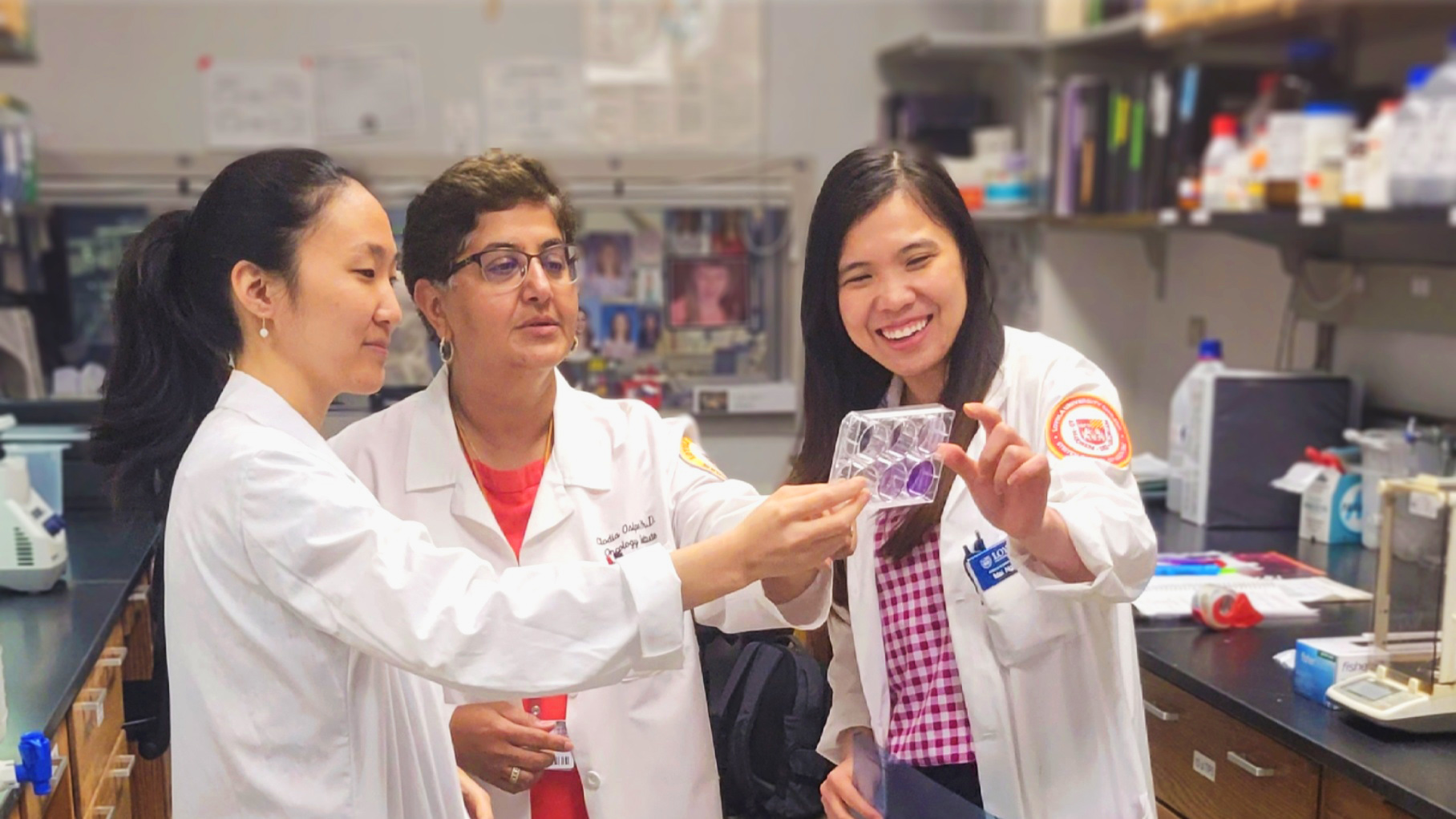
Cancer Research Training & Mentorship:
Building a Practice of Resilience
Hannah Denaer
Stritch MD/PhD students Emily Ma and Mai Nguyen are learning the art of bouncing back and bracing for uncertainty as they pursue research exploring drug resistance in breast cancer with Clodia Osipo, PhD, in her laboratory. Dr. Osipo, associate professor in the Department of Cancer Biology, mentors both students and Katherine Knight, PhD, chair of the Department of Microbiology and Immunology co-mentors Nguyen. One of the core values Dr. Osipo hopes to instill in students is a strong sense of persistence. “There are many times when the results are not what we expect,” she said, explaining that sometimes the hypothesis and data align, but, more often than not, results take researchers in unexpected directions. As Nguyen put it, “a guess is a guess.” Dr. Osipo, Ma, and Nguyen all expressed the importance of working with uncertainty rather than avoiding it.
More Than a Mentor
As a mentor, Dr. Osipo also values honest communication and has an open-door policy, welcoming students to bring her their ideas and questions. Ma recalled that “as a fresh PhD student, [she] didn’t know where to start,” and being able to bounce questions and potential hypotheses off of Dr. Osipo helped her grow critical thinking and reasoning skills. Nguyen shared a similar experience: as much as Dr. Osipo is a mentor, she’s also like “a mom” who looks out for students’ best interests. Working with students and seeing them develop is one of the best parts of Dr. Osipo’s work. “It keeps me young,” she said. Dr. Osipo saw Ma and Nguyen off to the finish line as they completed their PhDs in May and returned to their third year of medical school.
Dr. Osipo said that time and dedication are two of the most challenging aspects of cancer research. “Cells continue to grow even on a Saturday,” she said, laughing. Before becoming an MD/PhD student, Ma had little use for her calendar. Now, it’s a must-have. Organization and planning are essential for the MD/PhD program, as students have many priorities to manage. While research can be time-consuming, Nguyen said that her work days are flexible. As a self-described “night owl,” she can schedule her day to begin a bit later. Just as the research itself is unpredictable, so are Ma and Nguyen’s days in the laboratory.
Their research projects contribute to the laboratory’s overall goal: trying to understand how to improve survival for people with cancer.” For Ma, moving toward this goal looks like focusing on HER2-positive breast cancer and setting up experiments to find a new target that could treat or increase the drug sensitivity to this cancer. Nguyen took on a different research project, looking at the relationship between bacteria and breast cancer growth. Ma and Nguyen shared that they’ve both dealt with navigating unexpected results. “In research, it’s all about the question why,” said Ma.
Back to the Drawing Board
This question has followed Nguyen throughout her time in the laboratory, with unexpected results continuously sending her “back to the drawing board.” When asked if she had an example of a moment of resilience and patience in the laboratory, Nguyen laughed and said, “working on my whole PhD” Ma also has dealt with many unexpected outcomes. In late 2020, her research team realized the result they had been working with was a fluke. “We ended up essentially having to start over,” Ma said. Because of this shift, the last year of her PhD has been hectic and Ma finds herself in the laboratory most days of the week. “You have to just find it in yourself to keep going because your project is only going to be as good as the amount of work you put in,” she said.
Grant writing is another aspect of the MD/PhD program that has allowed Ma and Nguyen to practice patience. Both took an Advanced Immunology class where they learned the ins and outs of grant writing by reading scientific articles, writing grants based on these articles, and receiving feedback from faculty. Ma and Nguyen submitted the National Institute of Health F30 grant, which supports students pursuing an MD/PhD. The first time Nguyen submitted her proposal, it wasn’t approved. Receiving that response was difficult for Nguyen but she bounced back, submitted a new proposal and received the grant in Microbiology/Immunology. Ma didn’t get funded but found the experience valuable. “You’re constantly going to get no’s, but once you get a yes, that’s the driving force for continuing to do what you want to do,” she said.
Pursuing this dual degree, Ma and Nguyen are uniquely positioned to move from research to patient care — or, as Ma said, “from the bench to the bedside.” The resilience, dedication, and patience required for cancer research all affect real lives, placing people at the heart of the work. For Ma, one of the more challenging aspects of cancer research is the “ubiquitous” nature of the disease, making it one of the “heavier-burdened specialties.” Cancer touches many lives and presents so much unpredictability in research. Amid the uncertainty, Ma and Nguyen share excitement about the possibility of discovery.
Learn more about Stritch’s dual degree program.